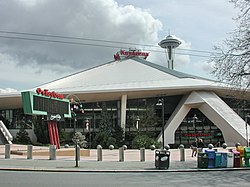First seasons
On November 16, 1993, the Continental Indoor Soccer League (CISL) awarded an expansion franchise to the Ackerley Group, owner of the Seattle SuperSonics of the National Basketball Association. [1] The region previously had other indoor teams, including the Tacoma Stars of the defunct Major Indoor Soccer League; a CISL bid for a Tacoma team had failed to garner support. [2] The team's name, the SeaDogs, was announced in November 1994 alongside the unveiling of head coach Fernando Clavijo, a member of the United States national team who played in the 1994 FIFA World Cup. [3] The team's mascot, a purple dog named "Salty", was named in a later fan contest. [4] The SeaDogs were among several professional soccer teams in the Seattle area that had begun to play in the mid-1990s, including the outdoor Seattle Sounders and Everett BigFoot. [5]
The SeaDogs held an open scrimmage prior to the regular season at their temporary home, Seattle Center Arena, that drew 98 spectators. [6] The team made their debut on June 23, 1995, where they defeated the San Jose Grizzlies 6–5 in sudden-death overtime in front of 3,529 spectators in Seattle. [7] They had poor attendance, with an average crowd of under 2,000 by early August, blamed in part due to competition from other professional soccer teams in the area. [8] The SeaDogs finished their inaugural season with a 12–16 record and missed the playoffs; during the offseason, they lost top scorer Jean Harbor to the Colorado Rapids and key forward Michael Collins to the Sacramento Knights. [9] Harbor later returned to the team on loan from the Rapids. [10]
The team moved to KeyArena for the 1996 season and had an average attendance of 3,812—ninth of eleven teams in the CISL and 26 percent of the arena's capacity. [11] The SeaDogs and Sounders, who played at nearby Memorial Stadium, had scheduled overlapping games on several nights that affected attendance figures for both teams. [8] The SeaDogs finished last in the Western Division with a 10–18 record and a league-low 143 goals scored, but the team earned a franchise-record 11–5 victory against the Detroit Neon in their final match of the season. [12] New signing Juan de la O won the CISL Goalkeeper of the Year Award for his performances, which included a league-low 148 goals allowed. [13] Seattle made several acquisitions late in the season and into the offseason, including John Olu-Molomo in a trade from the San Diego Sockers and ex-Sounders players Bill Crook and Dick McCormick. [10] [14]
Championship and folding
The SeaDogs began their 1997 season with a franchise-best seven consecutive wins, including five road games to open the year; Harbor led the team in scoring, followed by Olu-Molomo prior to an injury to his right shoulder. [15] [16] They then lost several matches and dropped from the top of the Western Division standings but regained first place in late August with a 14–5 record. [17] The SeaDogs finished the regular season with 21 wins and 7 losses—the best record in the league—and set several team records. They also drew an average of 2,769 spectators at KeyArena. [18]
The team were seeded in the Western semifinals against the fourth-place Portland Pride, who hosted the first leg and held to a 2–2 draw at halftime; the SeaDogs scored six goals in the second half to win 8–2. [19] Seattle completed a two-game sweep of Portland with a 6–5 victory at KeyArena with two last-minute goals to avoid a deciding mini-game round. [20] The SeaDogs then opened the Western Final against the Sacramento Knights with a 6–2 away victory and played the following night at KeyArena. [21] The Knights had a 2–0 lead at halftime, but four goals from the hosts gave Seattle a 4–3 victory and a berth in the CISL Championship against the Houston Hotshots, the 1996 runners-up. [22] [23]
The SeaDogs conceded four goals in the first two quarters of the championship's first game at KeyArena, played in front of 6,530, but rallied with three goals before halftime. [23] An additional two goals from the hosts forced a sudden death overtime period, during which Olu-Molomo scored within two minutes to win the game 6–5 for Seattle. [24] The SeaDogs clinched their first CISL Championship with a 7–1 win at The Summit in Houston the following night with two goals from McCormick. [25] The title finished a "worst-to-first" turnaround for the SeaDogs, who had the league's worst record in 1996 and were undefeated in the playoffs—a league first. [25] [26] Juan de la O was named the championship's most valuable player, having made 15 saves in the second game. [27]
The CISL folded following the departure of several teams at the end of the 1997 season; Seattle was one of three teams to commit to returning in 1998. [28] [29] Several teams moved to other indoor soccer leagues, but the SeaDogs elected to remain independent as its ownership explored various options. [30] In June 1998, Clavijo accepted an offer to become head coach of the Florida ThunderCats of the National Professional Soccer League (NPSL). [31]

